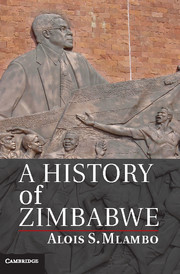Book contents
- Frontmatter
- Dedication
- Contents
- Figures
- Tables
- Maps
- Acknowledgements
- Timeline
- Notable Figures in Zimbabwean History
- 1 Introduction: Zimbabwe in Historical Perspective
- 2 Early States, c. 900–1900
- 3 The British Conquest State
- 4 Colonial Economy and Society to 1953
- 5 The Federation Years, 1953–1963
- 6 Nationalist Movements to 1965
- 7 Unilateral Declaration of Independence and African Response
- 8 Independent Zimbabwe, 1980–2000
- 9 The Crisis Years, 2000–2008
- 10 Conclusion: Zimbabwe Past, Present and Future Prospects
- Select Bibliography
- Index
- References
7 - Unilateral Declaration of Independence and African Response
Published online by Cambridge University Press: 05 June 2014
- Frontmatter
- Dedication
- Contents
- Figures
- Tables
- Maps
- Acknowledgements
- Timeline
- Notable Figures in Zimbabwean History
- 1 Introduction: Zimbabwe in Historical Perspective
- 2 Early States, c. 900–1900
- 3 The British Conquest State
- 4 Colonial Economy and Society to 1953
- 5 The Federation Years, 1953–1963
- 6 Nationalist Movements to 1965
- 7 Unilateral Declaration of Independence and African Response
- 8 Independent Zimbabwe, 1980–2000
- 9 The Crisis Years, 2000–2008
- 10 Conclusion: Zimbabwe Past, Present and Future Prospects
- Select Bibliography
- Index
- References
Summary
After Todd was forced out of office because of his perceived sympathy for African advancement, Edgar Whitehead took over as leader of the ruling United Federal Party and prime minister. He was keen to negotiate with Britain for Southern Rhodesia’s independence under white rule. His government’s strategy included reforming the country’s constitution in order to allow more Africans to vote in national elections by creating a lower voters’ roll, to be known as the ‘B’ Roll, with lower eligibility qualifications. Voters on this roll would vote for fifteen of the sixty members of parliament, with the ‘A’ Roll voters voting for the rest. These proposals were accepted by the 1961 London Constitutional Conference attended by members of the Southern Rhodesian Government, African nationalist leaders, including Joshua Nkomo, and representatives of the British government. African leaders were later to change their minds and denounce the constitution as not likely to promote African political advancement sufficiently to bring about any meaningful change for a long time.
Meanwhile white right-wingers, grouped under the opposition Dominion Party (later renamed the Rhodesian Front), felt that Whitehead had gone too far in the opposite direction and had made unacceptable concessions to African nationalism. On this ticket, the Rhodesian Front (RF) won the December 1962 general elections, and its leader, Winston Field, became prime minister, while Ian Smith served as deputy prime minister and minister of treasury. Failing to make any headway in the quest to obtain independence from Britain, Winston resigned in April 1964, to be succeeded by Ian Smith who was determined to gain the country’s independence under white rule at all costs. Driving this agenda was, of course, the long-established racial chauvinism that had fuelled the segregationist laws of the 1930s and which had, throughout the colonial period, nurtured the sense of paternalism which regarded whites as mentors and guardians of the African people who could not be trusted to run things on their own. The clarion call for Ian Smith and his supporters, thus, became the need to keep power in ‘responsible hands’, namely white hands. This resolve was strengthened by the civil war in the Congo at its independence in 1960 which saw many whites killed or forced to leave in the wave of riots and lawlessness that swept the country as the Belgian colonial rulers withdrew.
- Type
- Chapter
- Information
- A History of Zimbabwe , pp. 149 - 193Publisher: Cambridge University PressPrint publication year: 2014



